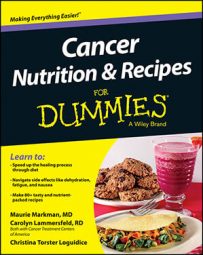When cancer is present, both it and its many treatments can have a considerable impact on your ability to take in nutrients and on your body’s ability to metabolize them, which can lead to malnutrition. When you become malnourished, your body’s ability to function properly declines and your immune function decreases, which may make it difficult to fight off an infection during cancer treatment.
Not surprisingly, malnourishment is common in the cancer setting. Studies have shown that 80 percent to 90 percent of people with cancer have signs and symptoms of malnutrition, and the National Cancer Institute (NCI) indicates that as many as 20 percent to 40 percent of people with cancer may die from malnutrition or its associated complications. Scary, right?
By definition, nutrition is the science of how the body ingests, digests, absorbs, and metabolizes nutrients. Cancer and its treatments can impact one or all of these steps that food must go through to nourish the cells of your body.
This can be caused by a physical issue, such as the location of the cancer, or by a biological or metabolic change, such as loss of appetite from a treatment or increased production of cytokines (proteins that carry messages between cells, regulating cellular function).
Here are some examples of how cancer and its treatments can impede ingestion, digestion, and absorption of nutrients and cause metabolic challenges:
Ingestion challenges: Cancer and its treatment can affect your ability to consume nutrients in a number of ways. Depending on the site of cancer, it can be difficult for food or liquids to get from the mouth to the digestive tract.
For example, the location of a head and neck cancer may make it difficult to chew and swallow foods; surgery, chemotherapy, and radiation for cancer may make it difficult to get food and liquid from the mouth to the digestive tract.
Cancer may also cause the body to produce cytokines to try to fight the cancer. When these compounds are produced in very high amounts, they may cause a loss of appetite. Cancer treatments can also lead to anorexia and cause a loss of appetite, making it difficult to consume enough food to get adequate nourishment.
In addition, cancer and its treatments may cause a host of other issues that can affect eating, such as a sore mouth or throat, taste and/or smell changes, and fatigue.
Digestion and absorption challenges: Digestion is the process by which food is physically and chemically broken down and converted into a substance suitable for absorption and assimilation into the body. Many cancer-related factors can make it difficult to digest and absorb nutrients.
For instance, cancer can cause the gastrointestinal tract to become obstructed or blocked so that food and liquids can’t be digested or absorbed. In such cases, nutrition may need to be provided intravenously or through a feeding tube until the obstruction is remedied.
Various cancer treatments, particularly chemotherapy and/or radiation to the abdomen, can sometimes cause lactose intolerance, even if there were no previous issues digesting milk and milk products. This is because chemotherapy and radiation, in addition to malnutrition, can cause changes to the cells lining the digestive tract, making normal digestion difficult.
Lactose, the sugar naturally found in milk, must be digested by the enzyme lactase in the small intestine. If lactase production is affected by cancer treatment, you may need to limit your intake of milk and milk products for a period of time. Milk that has the enzyme lactase added to it is available, and you may be able to tolerate it as an alternative.
Cancer of the gastrointestinal tract may make it difficult to digest and absorb nutrients from food, a condition known as malabsorption. This can result from the location of the cancer, or it can be a side effect of the surgery used to treat it.
Cancer of the stomach, pancreas, gallbladder, bile duct, and small bowel increases the risk of developing malabsorption of fat after surgery. Fat malabsorption may cause severe diarrhea and weight loss from the amount of calories that are not absorbed into the bloodstream but are instead lost in the stool. In such cases, pancreatic digestive enzymes may need to be prescribed to enable the digestion and absorption of fat.
Metabolic challenges: Metabolism is the chemical process by which living cells make energy available. The same cytokines that can decrease appetite may also cause changes in metabolism. These changes can affect the way the body metabolizes protein, carbohydrates, and fats, resulting in an increase in nutrient needs at a time when eating may be difficult.
As you can see, there are many ways that cancer affects your ability to eat and use nutrients. But don’t let this leave you feeling defeated. There are also many ways to bypass and manage these issues. Of course, if you experience a nutrition-related issue or a side effect that is impeding your ability to eat, be sure to discuss this with your oncologist and treatment team.

